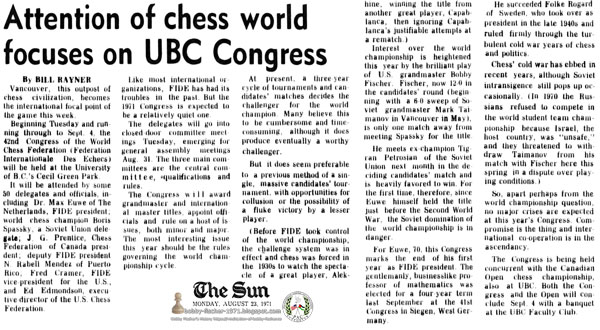The Vancouver Sun Vancouver, British Columbia, Canada Monday, August 23, 1971 - Page 25
Attention of Chess World Focuses on UBC Congress by Bill Rayner
Vancouver, this outpost of chess civilization becomes the international focal point of the game this week.
Beginning Tuesday and running through to Sept. 4, the 42nd Congress of the World Chess Federation (Federation Internationale Des Echecs) will be held at the University of B.C.'s Cecil Green Park.)
It will be attended by some 50 delegates and officials, including Dr. Max Euwe of The Netherlands, FIDE president; world chess champion Boris Spassky, a Soviet Union delegate; J.G. Prentice, Chess Federation of Canada president; deputy FIDE president N. Rabell Mendez of Puerto Rico; Fred Cramer, FIDE vice president for the U.S., and Ed Edmondson, executive-direction of the U.S. Chess Federation.
Like most international organizations, FIDE has had its troubles in the past. But the 1971 Congress is expected to be a relatively quiet one.
The delegates will go into closed-door committee meetings Tuesday, emerging for general assembly meetings August 31. The three main committees are the central committee, qualifications and rules.
The Congress will award grandmaster and international master titles, appoint officials and rule on a host of issues, both minor and major. The most interesting issue this year should be the rules governing the world championship cycle.
At present, a three-year cycle of tournament and candidates' matches decides the challenger for the world champion. Many believe this to be a cumbersome and time-consuming, although it does produce eventually a worthy challenger.
But it does seem preferable to a previous method of a single, massive candidates' tournament, with opportunities for collusion or the possibility of a fluke victory by a lesser player.
(Before FIDE took control of the world championship, the challenge system was in effect and chess was forced in the 1930s to watch the spectacle of a great player, Alekhine, winning the title from another great player, Capablanca, then ignoring Capablanca's justifiable attempts at a rematch.)
Interest over the world championship is heightened this year by the brilliant play of U.S. grandmaster Bobby Fischer. Fischer, now 12-0 in the candidates' round (beginning with a 6-0 sweep of Soviet grandmaster Mark Taimanov in Vancouver in May), is only one match away from meeting Spassky for the title.
He meets ex-champion Tigran Petrosian of the Soviet Union next month in the deciding candidates' match and is heavily favored to win. For the first time, therefore, since Euwe himself held the title just before the Second World War, the Soviet domination of the world championship is in danger.
For Euwe, 70, this Congress marks the end of his first year as FIDE president. The gentlemanly, businesslike professor of mathematics was elected for a four-year term last September at the 41st Congress in Siegen, West Germany.
He succeeded Folke Rogard of Sweden, who took over as president in the late 1940s and ruled firmly through the turbulent cold war years of chess and politics.
Chess' cold war has ebbed in recent years, although Soviet intransigence still pops up occasionally. (In 1970 the Russians refused to compete in the world student team championship because Israel, the host country, was “unsafe,” and they threatened to withdraw Taimanov from his match with Fischer here this spring in a dispute over playing conditions.)
So apart perhaps from the world championship question, no major crises are expected at this year's Congress. Compromise is the thing and international co-operation is in the ascendancy.
The Congress is being held concurrent with the Canadian Open chess championship, also at UBC. Both the Congress and the Open will conclude Sept. 4 with a banquet at the UBC Faculty Club.























